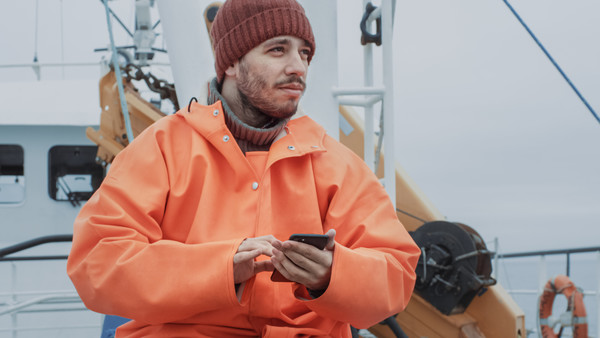Imagine being aboard a ship, with days to go to the nearest port. A colleague has fallen ill and there is no doctor on board.
Emergencies happen when least expected. The consequences at sea may be far-reaching, to the health of the seafarer as well as to the safety of everyone else on board.
Ill health at sea may also have logistical and economic consequences. Medical evacuations and repatriations can be complex and costly and take time. Interruptions to maritime operations result in financial losses.
How to prepare for the unexpected? How can we support our seafarers in managing medical emergencies at sea in the best way possible? Some of the answers lie in better use of technology.
A tailored solution
The Mariners Medico Guide is a free medical app, developed jointly by the Norwegian Centre for Maritime and Diving Medicine and the marine insurance company Gard, providing seafarers with step-by-step, action-based guidance to assess and treat medical issues at sea.
Designed and written by doctors specialised in maritime medicine, guidance is set out in simple steps and language for users with limited medical experience and includes advice on how to evaluate warning signs and when and how to contact public telemedical services.
The guide uses a symptom-based approach and covers both physical and mental health issues, as well as medical emergencies faced by seafarers.
It is tailored for seafarers and fishers and the risks and limitations they face at sea. Seafarers from more than 100 vessels worldwide have tested and contributed to the app throughout the innovation process.
Targeting an international audience, the guide is particularly mindful of the international nature of seafaring and cultural diversity of modern seafarers.
Always up to date and free of charge
The guide differs from other ship medical guides in several ways.
Being digital, it provides new ways of accessing information, through search functions and interactive navigation. In addition, the digital format enables medical knowledge to be presented in more innovative and intuitive ways, including the use of video and animation. It also means the guide is dynamic and flexible and can be continuously updated and improved, by medical specialists at the Haukeland University Hospital in Norway, in line with medical and technological developments as well as in response to feedback from users. This continuous quality process ensures that the guide is always up to date and that information accessed by seafarers represents current best practice.
Fully downloadable to any device, the guide is always to hand, right in the pocket of the seafarers. It can be used both online and offline, which is a significant advantage, allowing use mid-ocean and in remote parts of a ship – even without a signal.
The guide is free to use, regardless of nationality, geography or flag state. There is no restriction on the number of downloads. We encourage seafarers to download this free app, so that they are better prepared for their day of need.
Flag State approval
More than 15,000 seafarers are currently actively using the app, managing real life medical emergencies. Their feedback is overwhelmingly positive.
A number of international non-governmental organisations have publicly endorsed the guide and recommended its use, including the International Transport Workers Federation (ITF) and the International Maritime Health Foundation (IMHF).
The guide received flag state approval from the Norwegian Maritime Authority in 2022 as its national equivalent medical guide to the 2007 WHO International Medical Guide for Ships.
In February 2023, the guide was presented to the International Maritime Organisation (IMO) and the Sub-Committee on Human Element, Training and Watchkeeping (HTW) at its 9th session, where all flag states were invited to endorse and promote the guide.
A number of maritime administrations have already endorsed the guide, including Antigua and Barbuda, Bahamas, Dominica, Iceland, Greece, the Marshall Islands and Saint Kitts & Nevis. Many others are currently reviewing the guide for a similar recognition.
The guide was also recently presented to the World Health Organization (WHO) and representatives of the International Labour Organization (ILO).
We welcome cooperation with any party committed to health at sea and sharing our ambition for better access to health for all.
For more information, please visit www.medicoguide.com.
